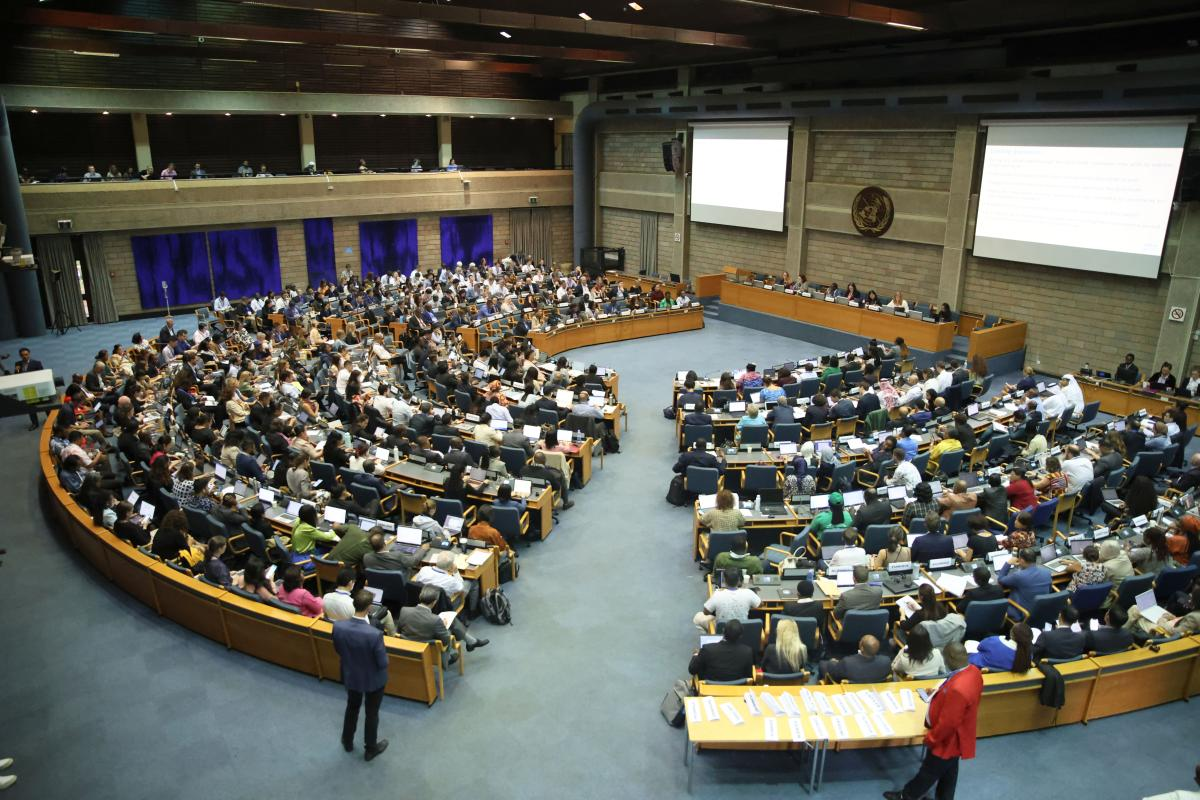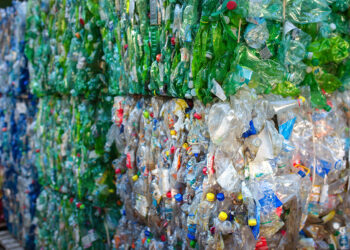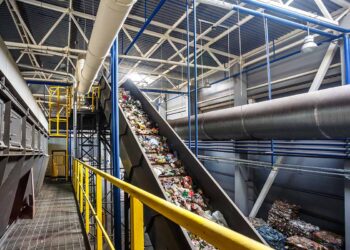The third meeting of the United Nations Intergovernmental Negotiating Committee officially kicked off Monday, inching the world closer to an internationally binding resolution on plastic pollution.
Delegates set the agenda and then dove into workshopping the “zero draft” text of the treaty. There was a mix of optimism and skepticism, according to those on the ground.
This United Nations Intergovernmental Negotiating Committee (INC) meeting is taking place in Nairobi, Kenya from Nov. 13-19. It’s the third meeting following a 2022 vote on a U.N. resolution to start the process of creating the global agreement. The idea of finalizing a legally binding agreement by the end of 2024 to end the leakage of plastic waste into the environment was supported by 175 nations.
According to the Earth Negotiations Bulletin, a division of the International Institute for Sustainable Development, the first official day had some hiccups but the “pressure to deliver was palpable.”
“With the draft before them, some were optimistic that the Committee would be able to meet the ambitious target of hammering out a new treaty by the end of 2024,” the Monday daily report noted. “‘Let’s leave all distractions behind now,’ shared one seasoned observer, ‘and keep our eyes on the prize.’ Others, however, were more cautious. ‘We do indeed have a Zero Draft, but we can’t proceed effectively until we see at least some of our views reflected in it,’ shared one delegate.”
First day activity
Jyoti Mathur-Filipp, executive secretary and INC secretariat, opened by calling on the delegates to move forward swiftly as “we hold in our hands the power to correct this destructive course.”
Delegates shared their initial positions. The Philippines, representing the Asia Pacific Group, stressed the importance of consensus-based decision-making, a comprehensive lifecycle approach to address legacy and existing plastics, the inclusion of Indigenous Peoples, national action plans, and avoiding duplication of existing agreements and instruments.
Ghana, speaking for the African Group, also prioritized sustainable production and consumption, eliminating problematic plastics and chemicals of concern, information disclosure, a just transition, a new dedicated multilateral fund, and addressing transboundary movement of plastic.
Samoa called for regulation of abandoned, lost or discarded fishing gear and plastics in the marine environment, including in the high seas. Palau, speaking for the Pacific Small Island Developing States, acknowledged that plastic has improved lives but said that should not be used as pretext to weaken the future treaty.
Oman, speaking for the Gulf Cooperation Council, took an opposite stance, underlining the importance of plastics to human life and their contribution to trade and economic development.
Saudi Arabia also emphasized the importance of striking a “delicate equilibrium” between the interests of all members, and said the current Zero Draft lacks balance, a view shared by Cuba, Iran and Russia.
Iran said the treaty should not address plastic raw materials, production or trade, but that it should enshrine the sovereign rights of states to exploit their own resources.
The U.S. echoed it wants the outcome of the meeting to be a working draft text that includes all views.
Second day movement
Delegates formed three “contact groups,” each assigned to review and work on specific parts of the draft. The groups will meet for the rest of the working session and prepare a final report by Saturday, Nov. 18.
Contact Group 1 discussed the proposed options for the draft objectives, and most delegations supported the options presented in the Zero Draft, with some preferring the option to “end plastic pollution, including in the marine environment, and to protect human health and the environment,” while others choose a more concise objective: to “protect human health and the environment from plastic pollution, including in the marine environment,” according to Tuesday’s daily report.
There was discussion about merging some options with their proposed sub options, and some delegates also argued against including targets with timelines in the objectives.
In Contact Group 2, the delegates spent Tuesday focused on the provisions on finance, and the proposed dedicated stand-alone fund and dedicated fund within an existing financial arrangement.
Support varied between which method to choose, and some delegates called for a hybrid approach using both an existing and new financial mechanism or an entirely different financing structure.
There were also discussions around whether a global plastic pollution fee would be appropriate.
Contact Group 3 went over the preamble, definitions, principles and scope of the Zero Draft, with most delegations preferring a short preamble. There was more debate on definitions, the report noted, though “most countries agreed on using relevant existing internationally agreed definitions.”
“The flexibility of delegates was on full display as they showed a willingness to ‘learn from past mistakes’ made in other processes, even accepting innovative proposals for the working modalities which, some hoped, ‘will be used for the rest of the meeting,'” the report noted, adding that the contact group format “allowed for honest and practical exchanges.”
Several coalitions also shared general comments Tuesday. The International Alliance Of Waste Pickers called for the recognition of waste pickers and other workers in informal or cooperative settings and mandated measures for a just transition. The Global Youth Coalition On Plastic Pollution proposed a youth expert working group to support implementation and the Indigenous Peoples Major Group wanted to ensure Indigenous Peoples’ sovereignty and free self-determination.
Observer reaction
In the lead-up to INC-3, there’s been a flurry of activity from observing groups, environmental organizations and others with an interest in the legally binding document.
The International Union for the Conservation of Nature, the Aspen Institute, the Ocean Foundation and Searious Business launched a public-private partnership, the End Plastic Pollution International Consortium (EPPIC), funded by the U.S. Department of State.
The goal is to bring together “governments, business, civil society, philanthropies and others to have reach and create opportunities that no single philanthropy, NGO, company or national government could create on its own,” according to a press release.
Another global coalition also formed called the Global Coalition for Plastics Sustainability, with Russia, Iran, Saudi Arabia, Cuba, China and Bahrain in membership.
The Environmental Investigation Agency (EIA) said the group’s creation is a formalization of what has played out in previous negotiations, when “prominent plastic producing countries have formed a ‘Coalition of the Unwilling’ and are coordinating efforts to prevent progress by pushing focus on preventing controls on production.”
Jacob Kean-Hammerson, EIA ocean campaigner, added that “we cannot afford to waste any more time, and ambitious countries must take the charge in shutting down these attempts to weaken the Treaty.”
The Global EPS Sustainability Alliance announced it wants to “address plastic pollution from a clean-slate perspective and to take a novel approach to problem solving.”
The group, which represents the EPS industry, added that “ambitious goals must be balanced with the reality of implementation challenges.”

























